Overview
Individuals can typically expect to lose about 4 to 8 pounds in a month through consistent lifestyle changes, such as maintaining a caloric deficit and engaging in regular exercise. The article supports this by highlighting that sustainable weight loss is influenced by factors like initial mass and adherence to healthy routines, emphasizing the importance of gradual, long-term strategies over quick fixes.
Introduction
Embarking on a weight loss journey is not just about shedding pounds; it's about embracing a healthier lifestyle that fosters overall well-being. Individuals can typically expect to lose between 4 to 8 pounds monthly, but this journey is influenced by various factors such as age, initial weight, and the consistency of their efforts.
With a growing desire among U.S. adults to adopt healthier habits, HR Benefits Managers have a unique opportunity to cultivate an environment that prioritizes wellness. By integrating personalized health coaching and sustainable practices into corporate wellness programs, organizations can empower their employees to achieve their health goals, enhance productivity, and foster a culture of resilience.
As strategies for effective weight management evolve, the focus shifts towards holistic approaches that not only promote weight loss but also improve mental and physical health, paving the way for a more engaged and thriving workforce.
Average Monthly Weight Loss: What to Expect
Individuals starting a reduction journey often wonder how much weight can I lose in a month, as they can generally expect to drop about 1 to 2 pounds weekly, resulting in a monthly decrease of approximately 4 to 8 pounds. However, factors such as initial mass, age, gender, and plan consistency can influence how much weight can I lose in a month? Initial loss may seem more pronounced due to the reduction of excess water mass, and as the body adjusts to healthier routines, sustainable reduction typically stabilizes within this range.
Supporting these efforts is crucial, as healthier-weight children have been shown to perform 13% better academically, underscoring the importance of well-being in all life aspects. Recent data reveals that in 2021, 60% of U.S. adults expressed a desire to adopt a healthier lifestyle, indicating a shifting mindset that HR Benefits Managers can leverage to foster an environment where healthy habits are prioritized. Foresight Health Coaching has successfully partnered with leading firms, as evidenced by the logos displayed, demonstrating the effectiveness of custom health coaching services in promoting employee wellness and motivation.
For instance, a case study from North Carolina showed that 35.67% of residents successfully lost pounds during the pandemic, illustrating adaptability in managing health even during challenging times. Moreover, the trend of increased protein consumption in the U.S. in 2023 indicates that dietary changes play a significant role in managing body composition, which can be integrated into workplace wellness programs to promote healthier eating habits among employees. Foresight Health Coaching offers innovative solutions, such as personalized coaching and fitness training programs tailored to the needs of firms.
By investing in these initiatives, organizations can enhance motivation and cognitive abilities, leading to a more engaged and productive workforce.
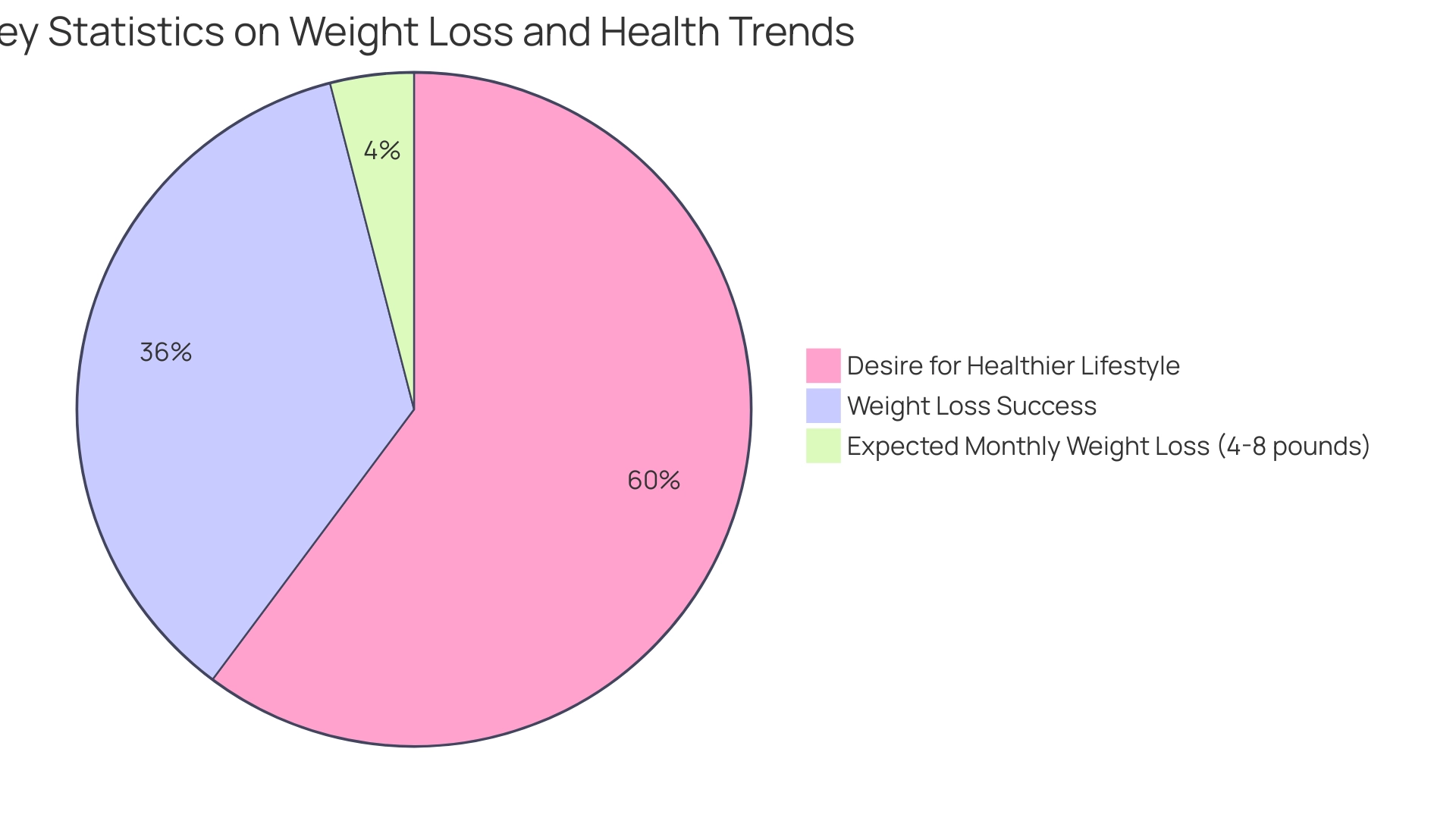
The Importance of Sustainable Weight Loss Practices
Sustainable practices for achieving a healthy body raise the question of how much weight can I lose in a month by emphasizing the significance of making gradual lifestyle changes that can be maintained over time. This approach includes:
- Embracing a balanced diet abundant in whole foods
- Committing to regular physical activity
- Prioritizing mental health
These are crucial components for determining how much weight can I lose in a month. Corporate wellness programs tailored to your team’s specific needs can significantly enhance these efforts, fostering a culture of healthy habits that not only improves weight loss outcomes but also boosts overall productivity and cognitive performance.
People often ask how much weight can I lose in a month when considering quick-fix solutions like extreme dieting or excessive exercise regimens, which typically lead to detrimental health effects and are rarely sustainable. By investing in tailored wellness programs, HR Benefits Managers can provide employees with individualized support and coaching, ensuring that they have the tools necessary for success. These programs not only assist in managing body mass but also contribute to reduced absenteeism and lower healthcare expenses, creating a new value structure within your firm.
Community resources, as illustrated in case studies, can offer valuable educational and counseling services, particularly when professional dietary counseling is limited. Furthermore, recent research has identified gene defects related to obesity, suggesting the potential for future interventions that could assist in managing body mass. As Robert, a patient, poignantly states, 'I don’t even know what’s the point of doing this anymore!'—a reflection of the emotional challenges many encounter in their journey to shed pounds.
It's vital to recognize that research indicates only 25 percent of individuals on diets sustain a decrease of 10 percent of their initial body mass after seven years, which makes me wonder, how much weight can I lose in a month, highlighting the necessity for a sustainable strategy. By assisting your teams in embracing these practices through optimized wellness and fitness programs, you develop a healthier, more resilient workforce prepared to face the challenges of 2024 and beyond.
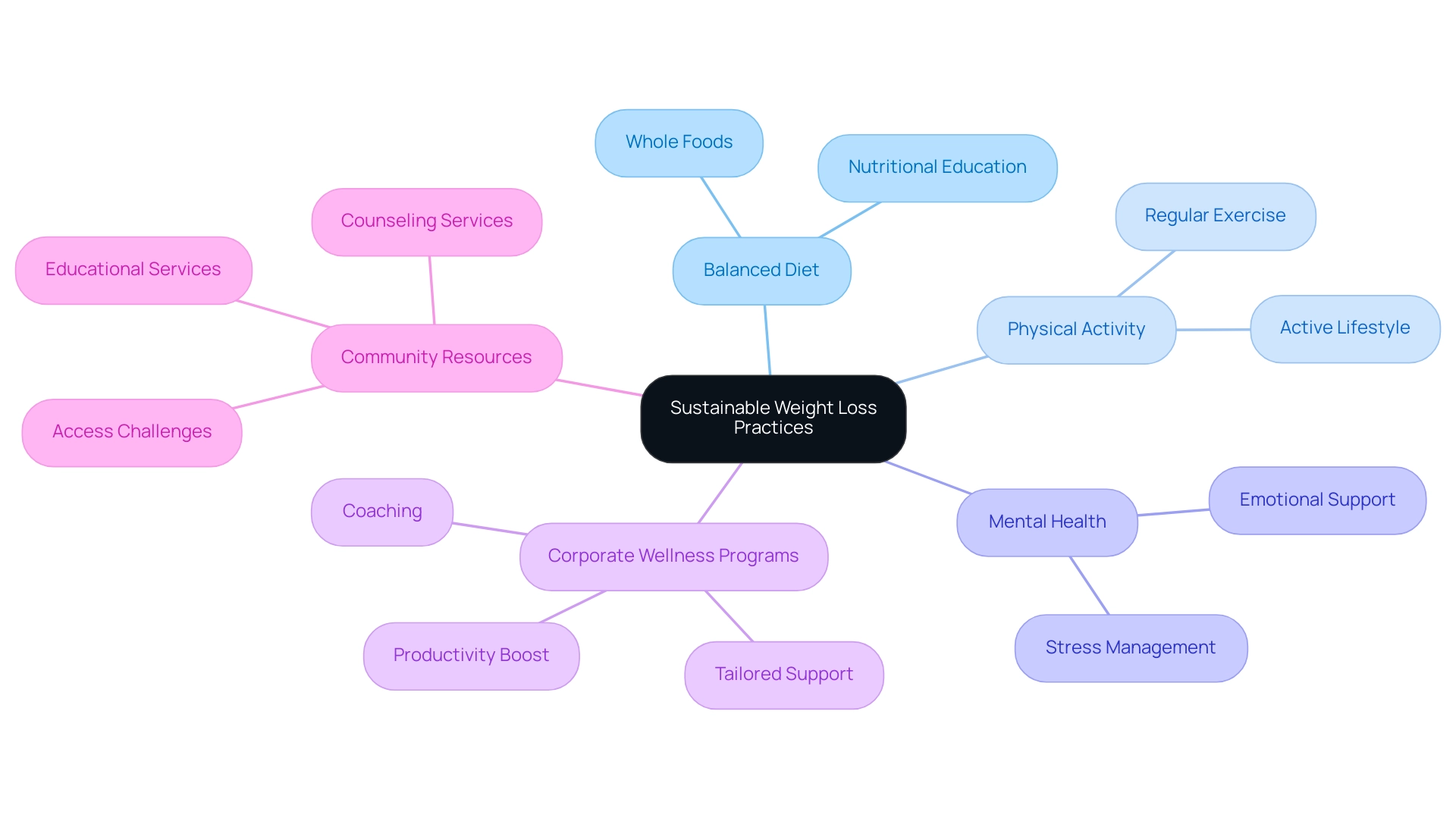
Effective Strategies for Weight Loss in a Month
Attaining a reduction in mass in merely one month can be achievable by adopting several effective strategies that promote both health and well-being:
- Create a Caloric Deficit: Start by tracking daily caloric intake and ensuring it remains lower than the total calories burned. Statistics show that adult men typically have a Basal Metabolic Rate (BMR) ranging from 1,600 to 1,800 calories per day. Understanding this can help tailor a sustainable caloric deficit.
- Incorporate Regular Exercise: Aim for at least 150 minutes of moderate aerobic activity each week, complemented by strength training twice a week. This balanced method not only aids in loss but also improves overall physical fitness. With Foresight Health Coaching, you can access personalized fitness coaching sessions directly through our user-friendly wellness app, which also features daily programming to keep you on track.
- Focus on Whole Foods: Prioritize the consumption of fruits, vegetables, lean proteins, and whole grains while minimizing processed foods. This shift not only supports management of body mass but contributes to better nutritional quality. Lizzo, for example, attributes her achievement in reducing body mass to three healthy practices: maintaining a balanced diet, regular exercise, and staying hydrated, all without the use of GLP-1 drugs.
- Stay Hydrated: Drinking plenty of water throughout the day is crucial. Proper hydration helps control hunger, supports metabolic processes, and can even enhance exercise performance. Our app provides reminders and tips to help you stay on track with your hydration goals.
- Get Adequate Sleep: Strive for 7-9 hours of quality sleep each night. Research suggests that insufficient sleep can greatly obstruct fat reduction efforts due to hormonal imbalances that influence appetite and metabolism.
In the realm of managing body composition, as highlighted by R.S.A.R., it is vital to acknowledge that lasting lifestyle modifications in diet and physical activity are essential. By integrating these strategies into daily routines and utilizing the support of our comprehensive wellness coaching app for personalized workouts, nutrition guidance, and community engagement, individuals can discover how much weight can I lose in a month through measurable results. Additionally, our corporate memberships provide a structured approach to wellness for teams, ensuring that employees have access to the tools and support they need to succeed.
Keep in mind, reducing body mass should not be the only indicator of achievement; encouraging lasting wellness practices can help everyone—even without significant reductions in mass. With Foresight Wellness Coaching, you empower your team to achieve their wellness goals efficiently and effectively.
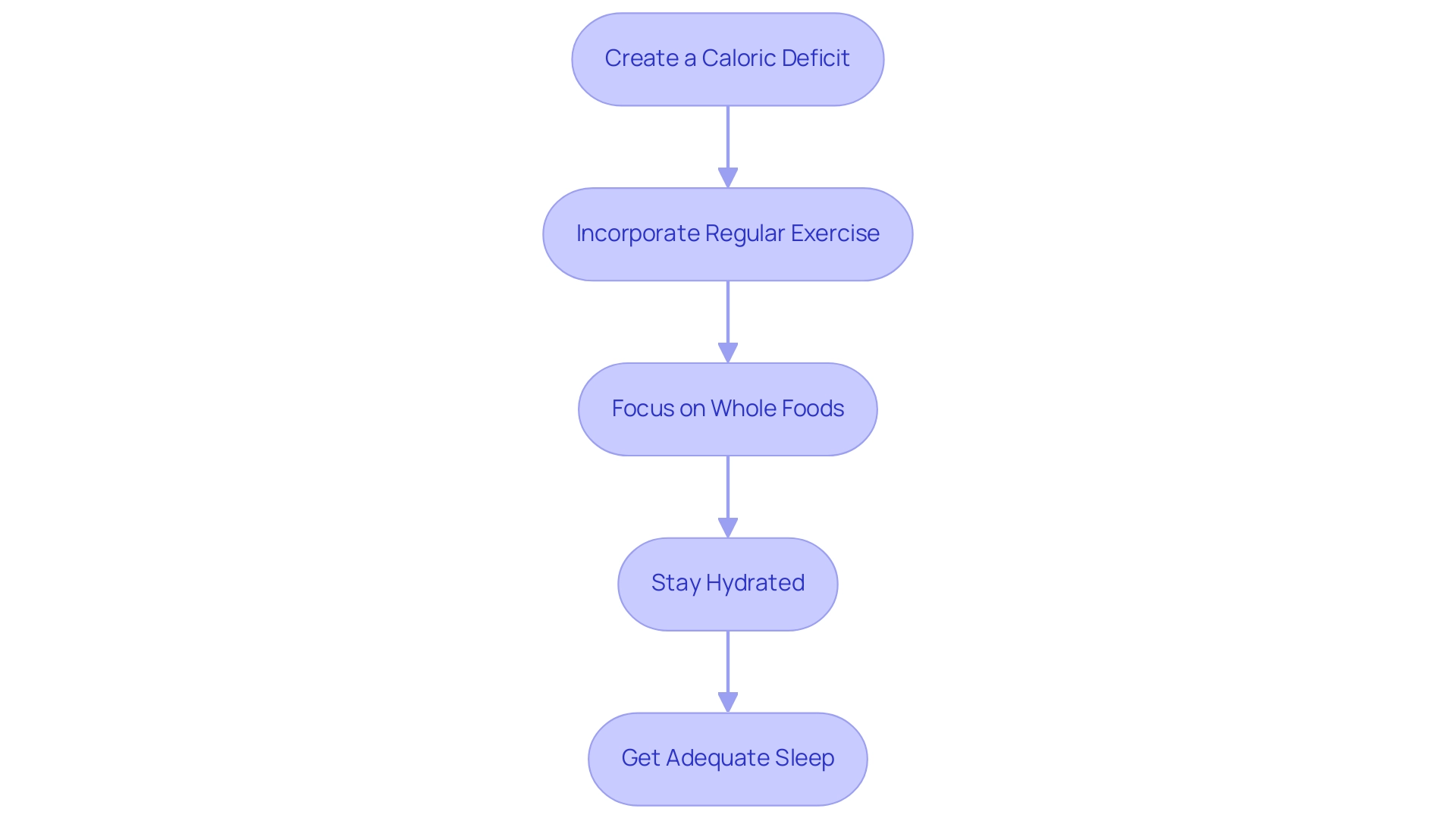
Medical Interventions and Their Impact on Weight Loss
While medical interventions like bariatric surgery provide effective solutions for individuals attempting to attain reductions in body mass through traditional methods, it's crucial to acknowledge the importance of personalized coaching for sustainable lifestyle changes. For instance, bariatric procedures such as gastric sleeve surgery demonstrate an impressive success rate of 85% over five years, significantly enhancing participants' quality of life. A comprehensive study reveals that individuals with a mean age of 36.4 years and a pre-surgery BMI of 44.5 kg/m² achieved a peak Excess Weight Loss of 75.09% by the third year, with a sustained Total Weight Loss of 33.41% after two years.
The safety profile was commendable, revealing zero leaks and low major complication rates. However, with 40% of patients experiencing regain in mass by the 7-year follow-up, the need for ongoing support—such as personalized health coaching—becomes evident. As W. English, a principal investigator for Allurion, noted, 'Bariatric surgery not only assists in reducing body mass but also plays a crucial role in enhancing mental well-being and eating habits, which are essential for long-term success.'
A client testimonial reinforces this point: 'Collaborating with my coach helped me not only shed pounds but also cultivate healthier habits that I can sustain for life.' Alongside surgical choices, appetite suppression and metabolism enhancement medications such as Mounjaro are emerging as effective tools. Recent clinical trials indicate promising results, solidifying their role in management strategies.
Yet, participating in medically supervised loss programs can bolster these efforts by providing the personalized support and guidance needed to navigate these options effectively.
Ultimately, it is crucial for individuals to consult healthcare professionals to identify the most suitable course of action tailored to their unique circumstances and health status. By combining medical interventions with personalized coaching and professional guidance, HR Benefits Managers can pave the way for sustainable management and improved well-being for their teams.
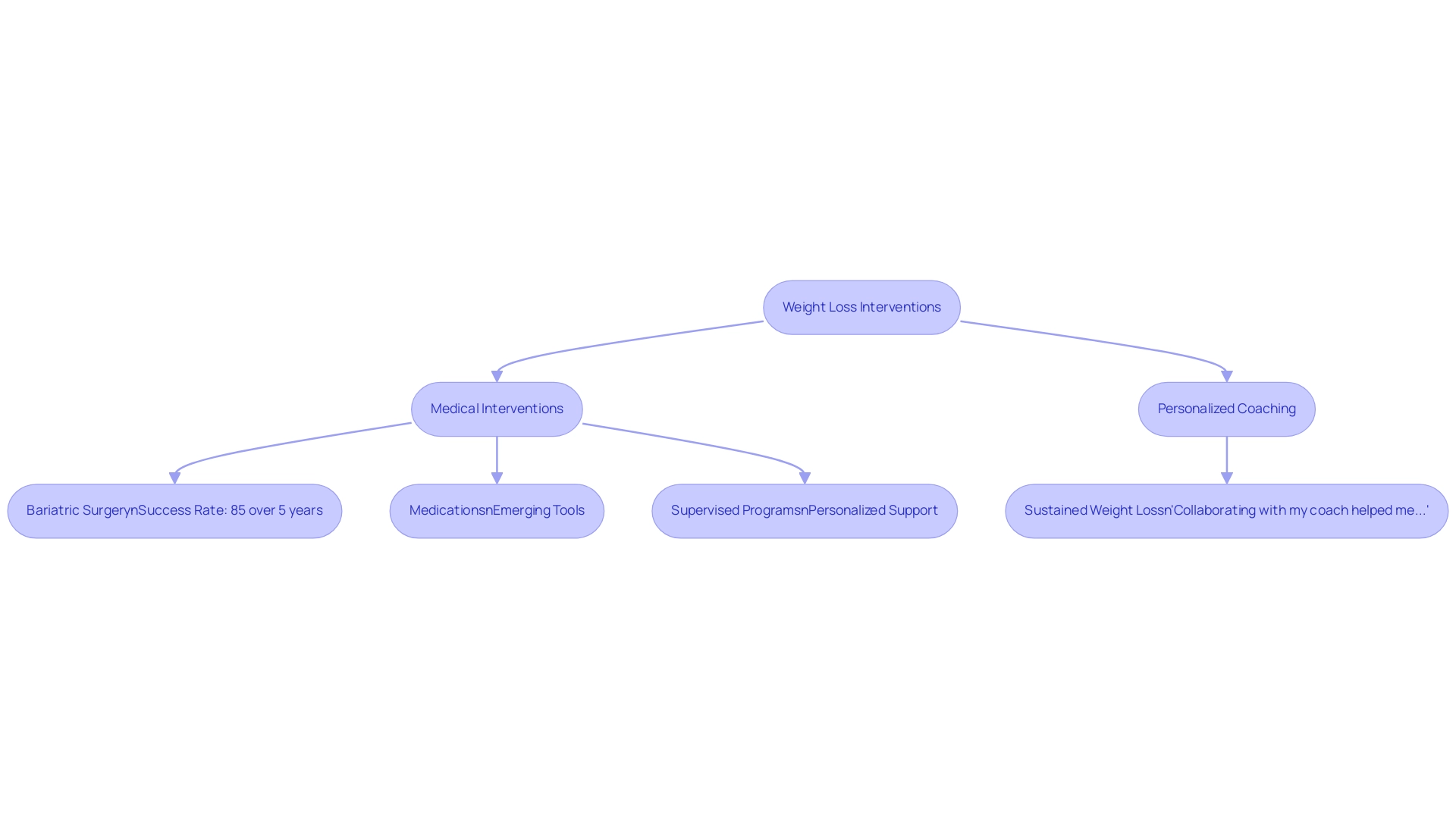
Setting Realistic Weight Loss Goals: What You Need to Know
Setting attainable goals for reducing body mass is essential for maintaining motivation and avoiding the discouragement that frequently comes with unachievable targets. Notably, 40% of Gen X women focus solely on dieting, underscoring the need for tailored goal-setting strategies for this demographic. Here are some empowering strategies for effective goal-setting:
- Be Specific: Shift from vague aspirations like 'lose fat' to clear, measurable objectives, such as determining 'how much weight can I lose in a month?' This specificity provides clarity and direction.
- Make It Attainable: Ensure your goals are within reach based on your current lifestyle and obligations. Tailoring your targets to your circumstances enhances the likelihood of success.
- Set Timeframes: Establishing a timeline for your goals instills a sense of urgency and accountability, helping you stay focused on your journey.
- Celebrate Small Wins: Acknowledge and reward yourself for reaching smaller milestones along the way. This practice not only acknowledges your efforts but also fosters a positive attitude towards your journey of achieving a healthier body.
To further support your weight loss journey, consider signing up for our free 7-day trial of the Foresight Health Coaching app! Discover the transformative potential of our wellness guidance program created to empower individuals through contemporary techniques and traditional knowledge. With features such as personalized coaching plans, interactive goal tracking, and community support, our app is tailored to help you achieve your health and wellness goals.
Real-world instances illustrate the influence of effective goal-setting on motivation for reducing body mass. For example, a recent study involving 36,794 participants revealed various motivations for reducing body mass, emphasizing the significance of personalized goal-setting. Moreover, experts emphasize that specific and achievable targets can significantly enhance motivation.
As stated by medical professionals, "Physicians are well-positioned to provide expertise and support in both inpatient and private practice settings." This reinforces the notion that setting realistic goals, along with professional guidance, can help individuals determine how much weight can I lose in a month?. Additionally, randomized trials are necessary to confirm the causal effects of goal setting on weight loss outcomes, providing a more balanced view of the evidence supporting effective strategies.
As we approach 2024, prioritize effective goal-setting and kickstart your journey to a healthier lifestyle with our app to fortify your commitment to health, ultimately leading to lasting change.
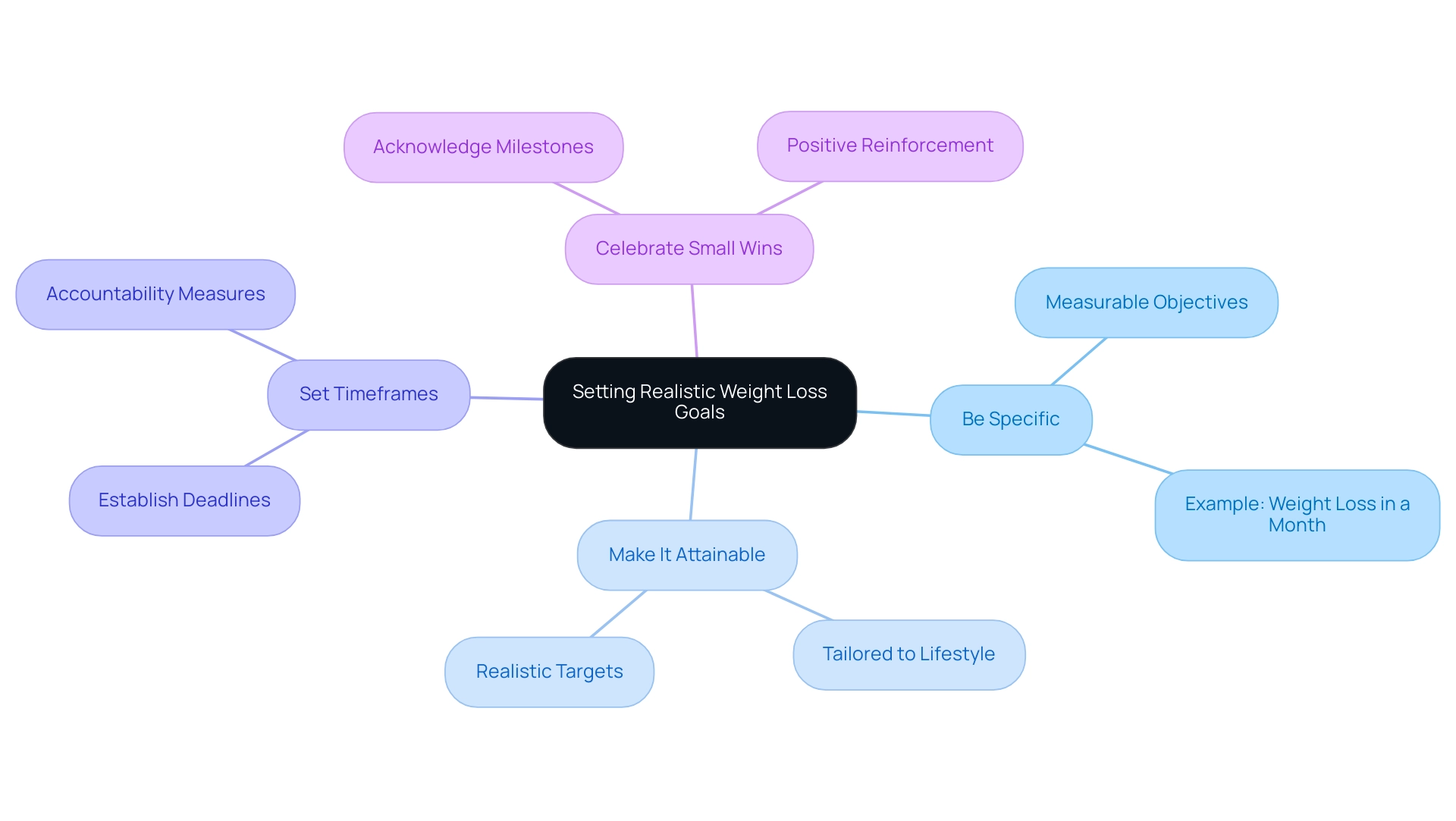
Conclusion
Embarking on a weight loss journey is a multifaceted endeavor that extends beyond mere numbers on a scale. Individuals can realistically expect to lose 4 to 8 pounds monthly, but achieving this requires a commitment to sustainable practices and a holistic approach to well-being. The importance of a supportive environment cannot be overstated; HR Benefits Managers have the unique opportunity to foster a culture that prioritizes health, empowering employees to make lasting lifestyle changes.
Integrating personalized health coaching and tailored wellness programs into the workplace can significantly enhance employee motivation and productivity. By recognizing the need for gradual lifestyle adjustments—such as balanced nutrition, regular exercise, and mental health support—organizations can cultivate a resilient workforce capable of navigating the challenges of modern life. Strategies like setting realistic goals and celebrating small victories further reinforce the path to sustainable weight loss.
As the landscape of weight management continues to evolve, it is essential to embrace innovative solutions that combine medical interventions with ongoing support. By equipping teams with the tools and resources they need, organizations not only contribute to individual health outcomes but also create a thriving workplace culture. The time to act is now; investing in employee wellness is not just beneficial for individuals but also for the overall success of the organization. Prioritizing health today paves the way for a more engaged and resilient workforce tomorrow.
Frequently Asked Questions
How much weight can I expect to lose in a month?
Individuals can generally expect to lose about 1 to 2 pounds weekly, resulting in a monthly decrease of approximately 4 to 8 pounds.
What factors can influence weight loss in a month?
Factors such as initial mass, age, gender, and plan consistency can influence how much weight one can lose in a month.
Why might initial weight loss seem more pronounced?
Initial weight loss may seem more pronounced due to the reduction of excess water mass, and as the body adjusts to healthier routines, sustainable reduction typically stabilizes within the expected range.
What are the benefits of healthier-weight children?
Healthier-weight children have been shown to perform 13% better academically, highlighting the importance of well-being in all aspects of life.
What percentage of U.S. adults expressed a desire to adopt a healthier lifestyle in 2021?
In 2021, 60% of U.S. adults expressed a desire to adopt a healthier lifestyle.
How can organizations support weight loss and wellness?
Organizations can invest in tailored wellness programs, such as personalized coaching and fitness training, to enhance motivation and cognitive abilities, leading to a more engaged and productive workforce.
What does research show about quick-fix weight loss solutions?
Quick-fix solutions like extreme dieting or excessive exercise regimens typically lead to detrimental health effects and are rarely sustainable.
What is the sustainability rate of weight loss diets?
Research indicates that only 25 percent of individuals on diets sustain a decrease of 10 percent of their initial body mass after seven years.
How can corporate wellness programs impact productivity?
Tailored corporate wellness programs not only assist in managing body mass but also contribute to reduced absenteeism and lower healthcare expenses, thereby boosting overall productivity.
What role do community resources play in weight loss?
Community resources can offer valuable educational and counseling services, particularly when professional dietary counseling is limited.




